
AI governance is essential as organizations increasingly rely on artificial intelligence. It ensures systems are ethical, transparent, and compliant with regulations. However, challenges like bias, privacy risks, and compliance gaps make governance complex. With global AI spending projected to double from $150 billion in 2023 to $300 billion by 2026, businesses need reliable tools to manage risk and scale responsibly.
Here are the top tools for AI governance:
Each tool addresses specific aspects of governance - like transparency, compliance, or security - making it crucial to align your selection with your organization’s priorities.
| Tool | Key Strengths | Limitations |
|---|---|---|
| Prompts.ai | Centralized AI model management, cost tracking, compliance | Limited focus on traditional ML models |
| Domo | Strong data visualization | Lacks AI-specific governance tools |
| Velotix | Privacy and data security | Limited AI model transparency |
| Monitaur | Continuous AI model monitoring | Narrow focus on model performance |
| Credo AI | Regulatory compliance and fairness | Designed for enterprise-level organizations |
| Holistic AI | Risk management and compliance | Features lack external validation |
| Truyo | Privacy compliance tools | Not tailored for AI-specific governance |
These tools represent different approaches to AI governance, from centralized platforms to specialized solutions. Choosing the right one depends on your goals - whether it’s reducing costs, ensuring compliance, or enhancing transparency.
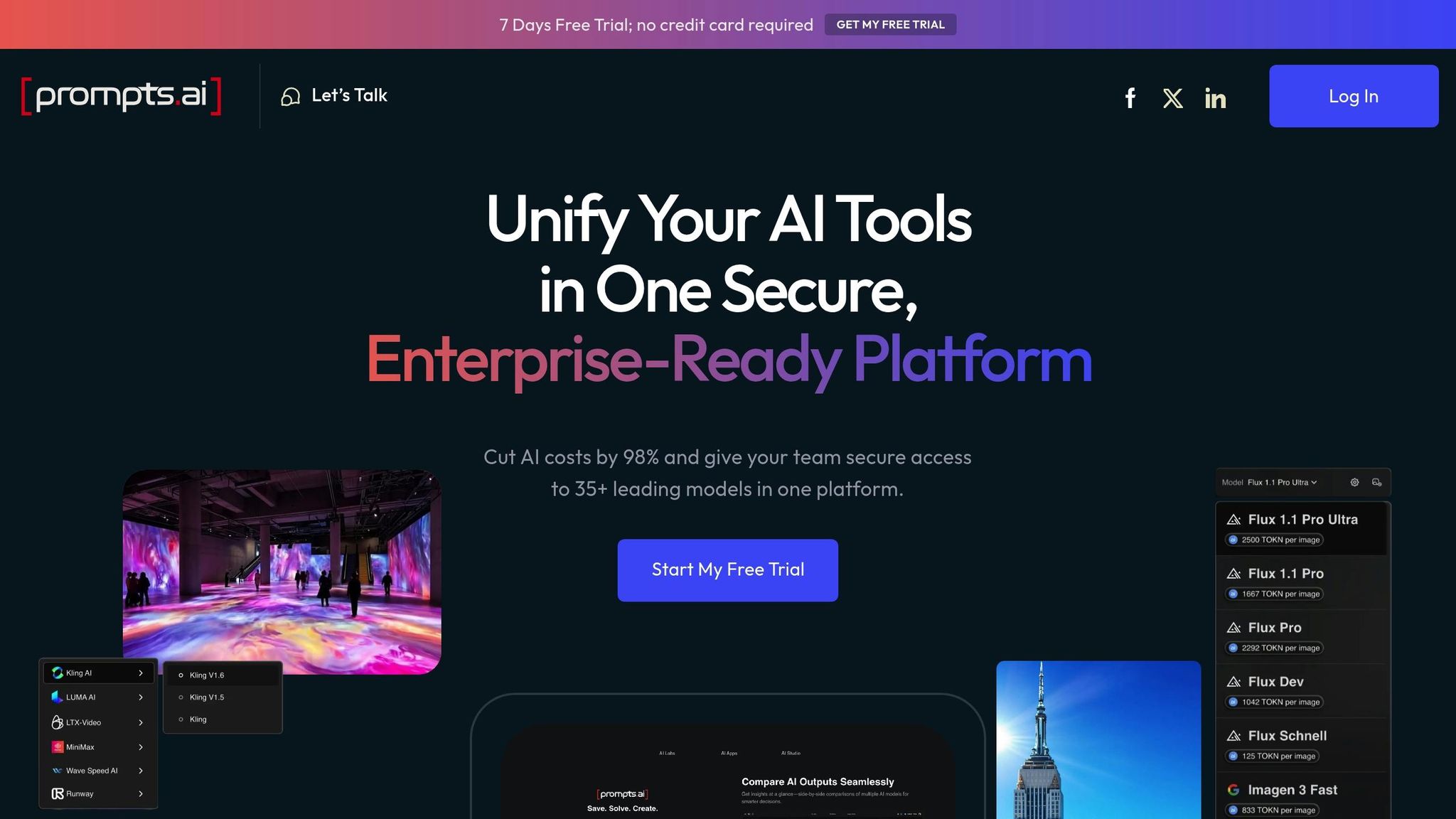
Prompts.ai is a robust AI orchestration platform designed for enterprises, offering centralized control to tackle AI governance challenges. By integrating over 35 top-tier large language models - including GPT-4, Claude, LLaMA, and Gemini - into a single, secure interface, it eliminates the chaos of managing multiple tools while ensuring strict compliance.
Prompts.ai brings clarity to AI operations by combining model selection, prompt workflows, and real-time cost management into one compliant system. Its centralized dashboard provides live updates on usage, spending, and performance for every AI interaction. With its FinOps layer, every token used is tracked, offering detailed insights into AI costs that can be directly linked to business outcomes and team activities.
The platform also enables side-by-side performance comparisons of different models, empowering teams to make informed decisions about which models best suit their specific needs. This allows organizations to not only track what their teams are doing with AI but also evaluate the effectiveness and cost-efficiency of various approaches.
Additionally, Prompts.ai maintains comprehensive audit trails for all workflows, making it possible to trace AI decisions back to their origins. This level of visibility is vital for demonstrating compliance to regulators or investigating issues in AI-driven processes.
Prompts.ai ensures compliance by integrating policies that safeguard sensitive data and transform unstructured experimentation into regulatory-ready workflows.
Organizations can implement consistent and compliant workflows that meet regulatory standards, turning AI experimentation into structured processes. The platform's governance tools allow administrators to enforce compliance policies across all AI interactions automatically.
To further support compliance, the platform offers Prompt Engineer Certification programs, helping organizations develop internal expertise and adhere to best practices. This structured training ensures that as AI adoption grows, compliance standards remain intact.
Security is a cornerstone of Prompts.ai, with enterprise-grade protections safeguarding every interaction. By routing all AI activities through its secure infrastructure, the platform minimizes risks associated with using multiple, unmonitored tools.
Its data protection measures ensure that sensitive information remains within the organization’s secure environment, even when utilizing external AI models. This addresses a key concern for businesses: the risk of data exposure when using various AI tools without oversight. This centralized approach not only enhances security but also supports the rapid scaling of AI operations.
Prompts.ai is built to grow with organizations, from small teams to global enterprises, without creating operational headaches. Its pay-as-you-go TOKN credit system eliminates the need for recurring subscription fees, allowing businesses to scale AI usage based on actual demand.
The platform can reduce AI software costs by up to 98%, compared to managing multiple standalone AI tool subscriptions. This cost efficiency is especially critical as AI adoption expands across departments and use cases.
Scaling is seamless, with new models, users, and teams added in minutes, avoiding the delays typically associated with procurement and setup. The unified interface also simplifies training and onboarding, enabling organizations to focus on a single platform rather than juggling multiple tools. This streamlined approach ensures that teams can quickly adapt to evolving AI needs without unnecessary complexity.
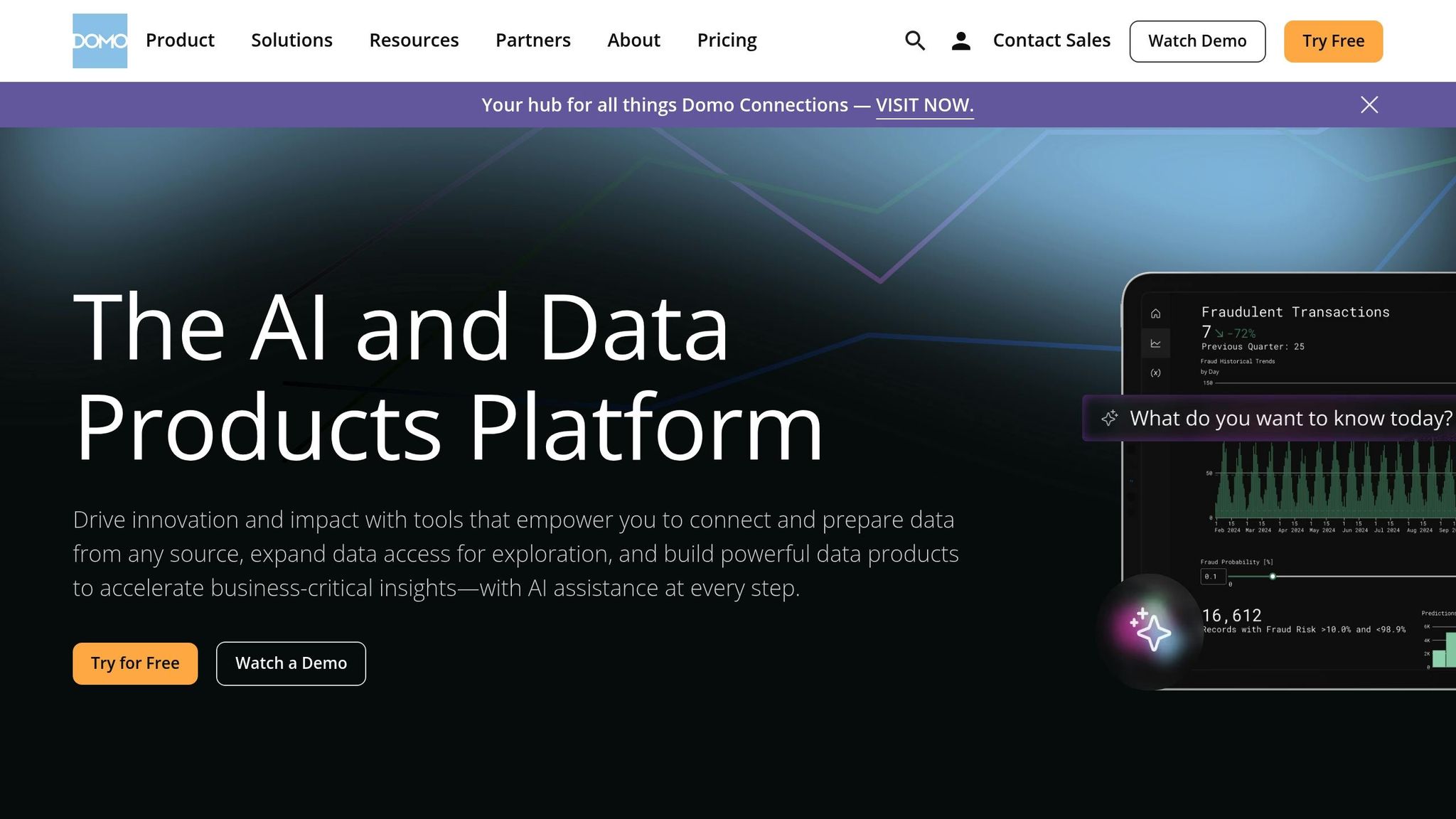
Domo is a cloud-based platform that specializes in business intelligence, offering tools for data visualization and real-time analytics. Through its interactive dashboards and the ability to integrate multiple data sources, Domo provides organizations with a centralized view of their data. This comprehensive perspective helps teams track and manage intricate processes, including those tied to AI governance, ensuring operations remain compliant and efficient.
Built on a cloud-native foundation, Domo is designed for seamless scalability, adapting to growing data volumes and governance demands. Its collaborative features enable teams to work together effectively, delivering tailored insights that drive informed decision-making.
Security is a key focus for Domo. With features like role-based access controls and data encryption, the platform protects sensitive information while promoting transparency and aiding compliance efforts.
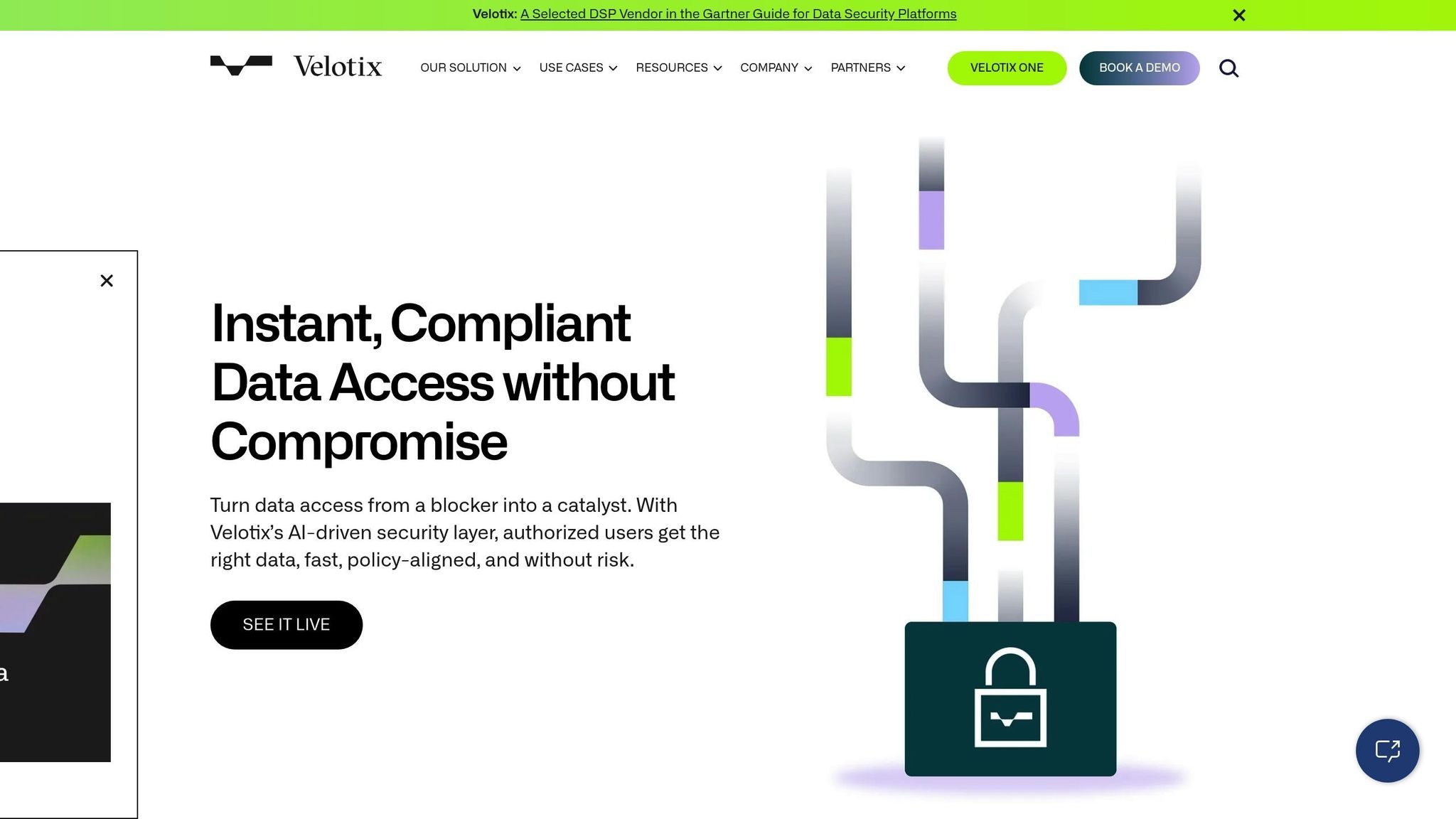
Information about Velotix's AI governance capabilities is still under review, and further evaluation is required to determine its potential applications. Meanwhile, attention shifts to Monitaur to explore its features for bias detection and compliance.
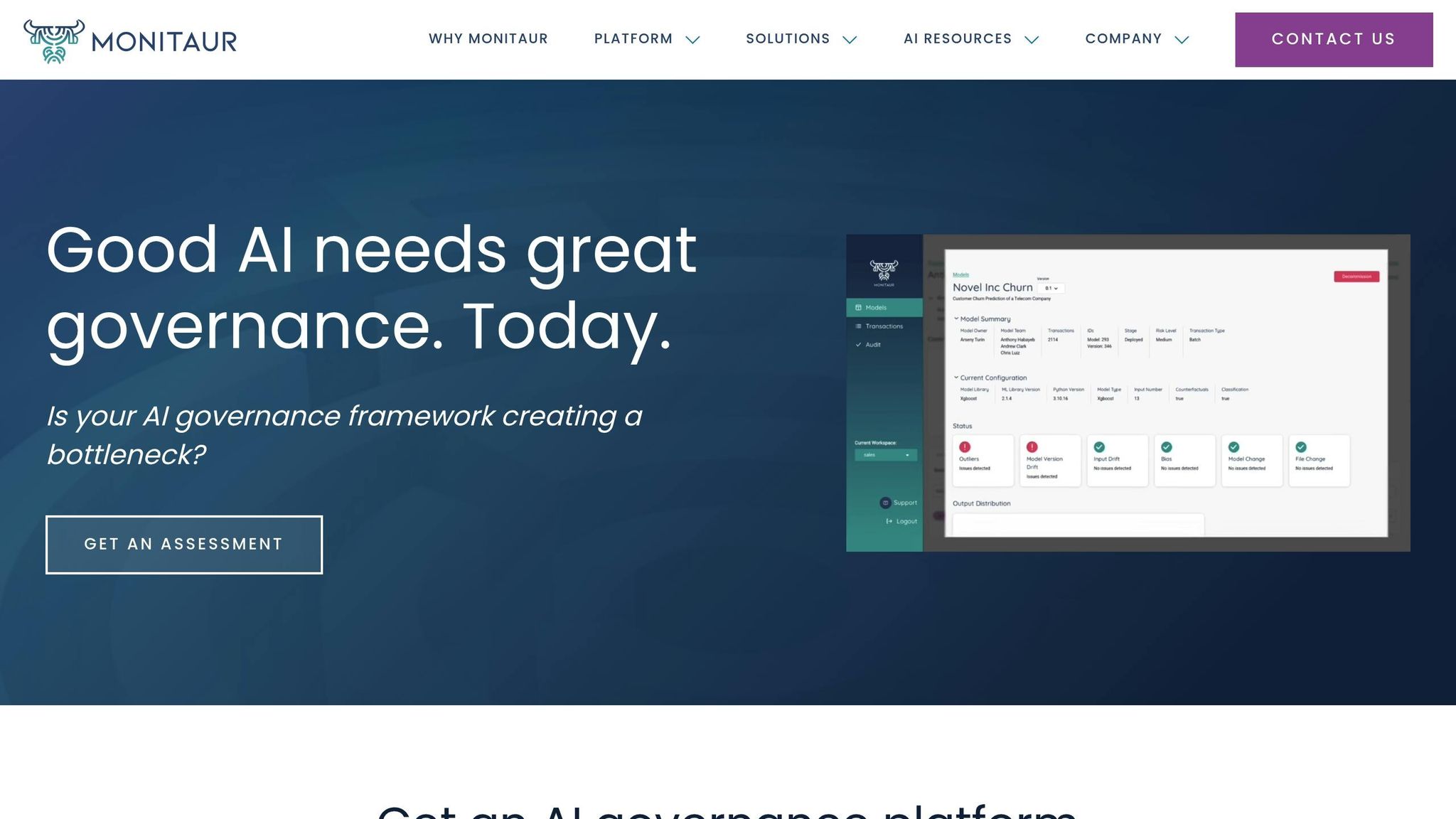
Monitaur focuses on ongoing oversight and risk management for AI systems, standing out as a key tool in the realm of AI governance. Rather than treating governance as a one-time setup, Monitaur emphasizes the importance of continuous monitoring after deployment, ensuring organizations maintain control over their AI operations.
Monitaur prioritizes real-time visibility into AI model performance and decision-making. It offers audit trails and dashboards that break down complex model behaviors into straightforward insights. These tools allow stakeholders to track performance metrics, identify concerns, and clearly explain AI-driven decisions. By simplifying technical operations into digestible reports, Monitaur bridges the gap between AI development teams and business leaders, fostering informed collaboration across the organization.
The platform's compliance features are tailored to meet a variety of regulatory requirements. Pre-built templates and continuous monitoring help organizations identify and address policy violations. Monitaur also maintains detailed records of AI activities, including timestamps, user actions, and system responses. This comprehensive documentation supports audits and reduces risks, ensuring a strong foundation for regulatory adherence.
Monitaur safeguards data and model integrity through robust security measures. Role-based access controls ensure that only authorized personnel can interact with sensitive systems, while anomaly detection alerts teams to unusual behaviors. These features help organizations align data handling with both internal policies and external regulations.
Built to handle enterprise-level demands, Monitaur is equipped to monitor hundreds of AI models across various environments, whether cloud-based, on-premises, or hybrid. Its ability to automatically allocate resources ensures smooth performance as governance requirements grow. This scalability makes Monitaur a vital component of a well-rounded AI governance strategy, seamlessly integrating with centralized platforms to provide thorough oversight.
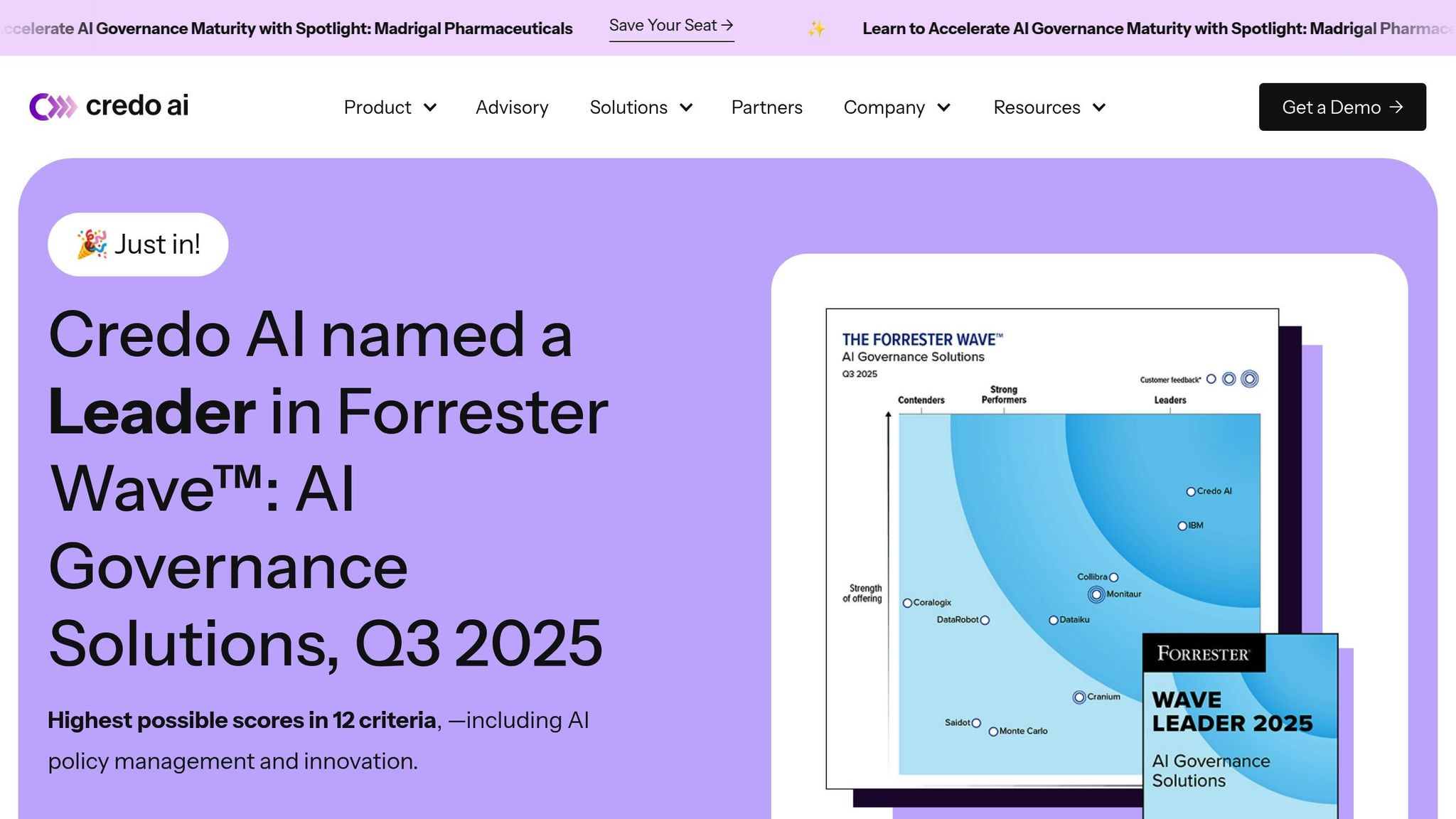
Credo AI provides a Responsible AI Platform designed to help organizations navigate the complex landscape of AI regulations and ethical guidelines. By generating audit-ready evidence and detailed model documentation, the platform simplifies compliance processes, especially when regulatory scrutiny arises. Like similar tools, Credo AI prioritizes transparency, adherence to regulations, and governance that can scale with enterprise needs.
Credo AI tackles the increasing need for transparency in AI systems by offering advanced documentation tools. One standout feature is its ability to automatically create model cards, which detail how AI systems make decisions. This is becoming increasingly important as regulatory expectations evolve.
Gartner predicts that by 2026, over 70% of companies will require vendors to provide model cards - essentially transparency sheets for AI systems.
The platform translates complex AI decision-making into clear, concise reports that can be understood by both technical experts and business stakeholders. This ensures that everyone in the organization, regardless of their technical background, can grasp how AI systems function and make decisions. These transparency tools help bridge the gap between technical teams and business leaders, fostering better communication and understanding.
Credo AI is built to address a wide array of regulatory requirements. It supports compliance with specific laws like the EU AI Act, NYC Local Law 144, and Colorado SB21-169, while also aligning with broader frameworks such as the NIST AI Risk Management Framework. This flexibility allows organizations to tailor their compliance strategies to meet various regulatory demands.
The platform's automated technical assessments, including bias detection tools, help identify potential issues early, reducing the risk of non-compliance. Credo AI also maintains detailed audit trails and generates the necessary documentation for regulatory reviews, significantly cutting down the time and effort typically required for these processes.
With features like tracking and reporting, the platform ensures that organizations can demonstrate ongoing compliance. This proactive approach allows businesses to stay ahead of regulatory changes rather than rushing to catch up when new requirements emerge.
Credo AI is designed to scale alongside enterprise AI initiatives, offering governance solutions that can grow with an organization's needs. The platform earned a perfect 5/5 score across 12 key criteria in The Forrester Wave™: AI Governance Solutions, Q3 2025, underscoring its enterprise-readiness.
Navrina Singh, Credo AI’s Founder and CEO, emphasizes that governance should not hinder innovation but instead enable it.
"Governance should not be seen as a barrier to innovation. If done right, it will enable it." - Navrina Singh, Founder & CEO
This mindset is evident in the platform's design, which supports organizations as they expand their AI programs. Credo AI’s consistent presence in analyst reports and its recognition as a leader in AI governance highlight its ability to meet the demands of enterprises across diverse industries and use cases.
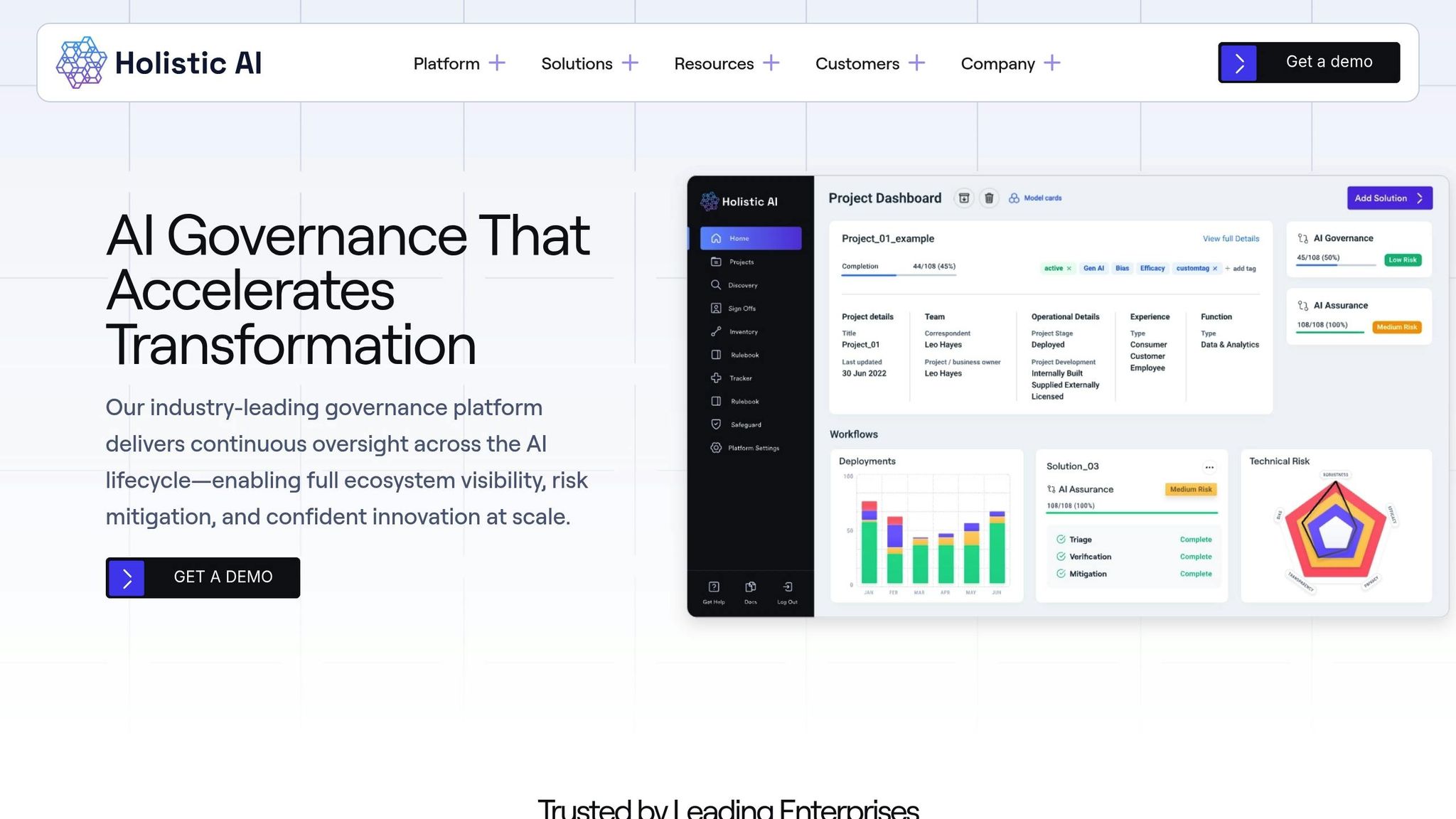
Holistic AI presents itself as a platform that integrates risk management, transparency, and compliance into a single governance framework. While these features sound promising, they currently lack independent verification to back up the platform's claims.
The platform highlights several key offerings: it aims to provide explainable processes with detailed documentation to help stakeholders better understand AI decision-making; supports compliance through automated assessments and frameworks tailored to various regulatory requirements; and promises governance controls that can scale alongside growing AI operations. However, without external validation, these features remain assertions rather than proven capabilities.
In comparison to platforms with verified tools and measurable governance outcomes, Holistic AI's claims still need substantiation to establish their credibility. Until such verification is available, its potential benefits remain speculative.
Truyo serves as a privacy and data governance platform, focusing on managing data privacy and ensuring compliance with regulations. While it plays a key role in handling privacy compliance and managing data subject rights, its features are more aligned with general data governance than the specific demands of AI governance. This privacy-first approach makes Truyo a useful addition to a governance strategy but not a standalone solution for overseeing AI systems. Unlike platforms designed specifically for AI model validation, Truyo prioritizes privacy compliance as its primary strength.
Truyo’s compliance tools are designed to help organizations navigate complex data privacy regulations. The platform automates data subject access requests (DSARs) and simplifies consent management workflows. It also includes features like automated privacy impact assessments and tools for tracking the flow of personal data. However, these capabilities focus on general privacy management rather than addressing AI-specific concerns such as bias in algorithms, transparency in decision-making, or adapting to emerging AI regulations. To fully meet AI governance needs, organizations would need to pair Truyo’s privacy tools with other solutions that specialize in AI model validation and fairness testing.
The platform provides data lineage tracking and documentation tools that enhance visibility into how data is sourced, processed, and stored. These features help clarify the flow and origin of data, which is crucial for privacy compliance. However, Truyo does not extend its transparency features to include insights into AI models or the logic behind algorithmic decisions. For organizations aiming to achieve full transparency in AI governance, these omissions highlight the need for complementary tools that address explainability and algorithmic accountability.
Truyo incorporates robust security measures, including role-based access controls, encryption (both in transit and at rest), and audit logging, to protect sensitive data. These features ensure the integrity of the data that underpins AI systems. However, the platform’s security measures are tailored to traditional data protection and do not specifically address challenges unique to AI, such as defending against model poisoning or adversarial attacks. While Truyo effectively secures foundational data, organizations must implement additional safeguards to protect AI models and systems from these specialized threats.
Every tool in this comparison brings its own strengths and challenges. Below is a detailed breakdown of their standout features and limitations.
Prompts.ai simplifies access to over 35 language models through a single platform. Its pay-as-you-go TOKN credit system eliminates the need for recurring subscriptions, potentially cutting AI software costs by up to 98%. The platform ensures robust security and provides clear cost insights. However, its focus on large language models might not meet the needs of organizations relying on traditional machine learning approaches.
Domo shines in data visualization and business intelligence, making it particularly useful for presenting AI governance metrics to stakeholders. Its cloud-native design supports scalability and integrates seamlessly with existing business systems. That said, its general-purpose nature limits its ability to handle specialized tasks like AI model validation or bias detection.
Velotix is a strong choice for organizations prioritizing data security and privacy. Its automated data discovery and classification features help maintain compliance with privacy regulations. However, its focus on data security means it lacks features for AI transparency and explainability, often requiring supplementary tools for complete AI governance.
Monitaur specializes in continuous model monitoring, offering detailed insights into model performance. However, it does not provide broader governance capabilities, such as comprehensive compliance management or tracking data lineage.
Credo AI takes a well-rounded approach to AI governance, emphasizing ethical AI practices and regulatory compliance. It offers valuable tools for bias detection and fairness assessment. However, its focus on enterprise-level solutions may present challenges for smaller organizations with limited resources.
Holistic AI delivers a broad range of AI risk assessment and management tools, excelling in regulatory compliance preparation. While its comprehensive approach is effective, the platform's steep learning curve and high resource demands can slow down implementation.
Truyo is a standout for privacy compliance, particularly in managing data subject rights and automating access requests. Its strong focus on privacy makes it ideal for organizations with stringent data protection needs. However, its lack of AI-specific features, such as algorithmic transparency and model validation tools, limits its utility for AI governance.
The following table provides a quick reference guide summarizing each tool’s key attributes:
| Tool | Transparency | Compliance | Security | Scalability |
|---|---|---|---|---|
| Prompts.ai | High - Real-time usage visibility, audit trails | High - Enterprise-grade governance controls | High - Enterprise-level data protection | Excellent - Cloud-native, pay-per-use scaling |
| Domo | Medium - Strong data visualization tools | Medium - General compliance features | Medium - Standard cloud security | High - Scalable cloud-based architecture |
| Velotix | Low - Limited AI model transparency | High - Privacy regulation compliance | Excellent - Advanced encryption, security | Medium - Scales well for security needs |
| Monitaur | High - Detailed model performance insights | Medium - Focused on model compliance | Medium - Standard monitoring security | Medium - Scales for monitoring needs |
| Credo AI | High - Comprehensive explainability tools | Excellent - Robust regulatory compliance | High - Enterprise-grade security | High - Tailored for large-scale enterprises |
| Holistic AI | High - Comprehensive risk transparency | Excellent - Strong compliance preparation | High - Comprehensive security framework | High - Scalable for enterprise needs |
| Truyo | Medium - Data lineage and documentation | High - Automated privacy regulation tools | High - Robust data protection measures | Medium - Scales for privacy compliance |
This comparison shows that no single platform dominates across all categories. Choosing the right tool depends on your organization's specific governance goals and technical needs.
As businesses increasingly integrate AI into their decision-making processes, the importance of effective governance cannot be overstated. Managing AI risks and maintaining ethical standards requires more than just oversight; it calls for platforms that ensure transparency, accountability, and regulatory compliance. These platforms represent the kind of comprehensive approach needed to tackle the challenges of AI governance.
Prompts.ai’s unified orchestration platform demonstrates how these needs can be addressed. With features like real-time usage tracking, detailed audit trails, and cost controls that can cut AI software expenses by up to 98%, it provides a solution tailored to both governance and financial efficiency. This aligns with earlier discussions on the necessity of transforming scattered tools into cohesive frameworks. Additionally, other tools with specialized functions can complement such platforms, giving organizations the flexibility to prioritize their specific governance needs.
Transparency and accountability remain at the heart of effective AI governance. Tools that shed light on how AI systems are built, deployed, and operated are critical for building trust and allowing stakeholders to grasp the ethical dimensions of AI-driven decisions. This includes features like model explainability, data visibility, and bias assessments - essential elements for avoiding the pitfalls of "black box" AI systems. By combining robust orchestration with specialized monitoring tools, organizations can achieve governance that is both thorough and trustworthy, ensuring AI systems operate ethically and effectively.
AI governance comes with several pressing challenges, such as tackling bias and fairness, safeguarding data privacy and security, and maintaining transparency and compliance amidst constantly evolving regulations. These challenges not only affect trust in AI systems but also pose considerable risks to organizations.
To navigate these complexities, specialized tools have become indispensable. For instance, bias detection software helps identify and correct unfair outcomes, ensuring more equitable AI decisions. Similarly, compliance management platforms assist organizations in keeping up with shifting regulatory requirements. Additional tools are designed to monitor AI workflows, addressing potential risks and promoting responsible, ethical AI use. By leveraging these solutions, organizations can enhance trust, minimize risks, and deploy AI systems that operate ethically and effectively.
Prompts.ai places a strong emphasis on security and compliance, leveraging an enterprise-level architecture tailored to effectively manage multiple AI models. Among its standout features are secure API handling, comprehensive audit trails, and permission controls that regulate access and uphold organizational policies.
To enhance data protection and meet regulatory standards, Prompts.ai incorporates real-time monitoring, federated identity management, and advanced security protocols. These measures work together to reduce risks, protect sensitive information, and ensure AI workflows remain both secure and compliant - all while maintaining peak efficiency.
When selecting an AI governance tool, the first step is to pinpoint your organization’s specific needs. This might include complying with industry regulations - such as those in healthcare or finance - or addressing ethical priorities like reducing bias and ensuring transparency. Look for tools that provide features like automated compliance checks, real-time risk monitoring, and smooth integration with your current AI systems.
Equally important is assessing whether the platform supports your operational objectives and regulatory demands. Focus on solutions that promote ethical AI practices, enhance workflow efficiency, and enable responsible AI use. Choosing a tool tailored to your organization’s unique challenges will help you get the most out of your governance efforts.


